
PAN’s community based research (CBR) projects are guided by collaboration, change, and inclusion. CBR begins with needs identified by a community and includes people in the community on the research team. Research questions are developed, answers are sought, and findings are brought to the community so they may use the information to educate and advocate for changes they want to see.
Two of PAN’s CBR projects were initiated by the community of people living with HIV (PLHIV): The BC People Living with HIV stigma Index (Stigma Index) and Positive Living Positive Homes (PLPH). Both studies gathered information from multiple areas in the province so findings could reflect varied realities experienced by PLHIV in BC.

We are in the process of shaping findings for communities to use. The knowledge translation team includes two Knowledge Translators who are familiar with the Stigma Index and PLPH from earlier stages of the projects. Antonio Marante (working on the Stigma Index project) and Dan Wilson (working on PLPH) share their involvement in the projects, findings and where things go from here.
When did you first get involved with the project you’re working on? Why?
Antonio: I started as Peer Research Associate (PRA) in the Stigma Index Project in September 2017. I was trained with five other PRA from other Health Authorities in the province. I interviewed participants on Vancouver Island. I connected deeply when I disclosed my HIV status with them, building trust with participants.
Dan: Back in 2015, I approached Mona Lee, Greater Vancouver coordinator of the Positive Living Positive Homes (PLPH) study, to participate in the research. I had been having problems with housing and my housing provider, and wanted to contribute to the study that focuses on an important subject of housing by sharing my experiences. Ultimately, I hoped to change things for the better.
What interested and encouraged you to get more involved with the research as it moved into knowledge translation phase?
Antonio: I am interested to communicate and learn the project findings. Additionally, I am interested to learn how communities are connected to these outcomes. For example, I want to see and discuss how communities understand the information we are delivering, what they think about these results, how they are connected to the project findings, and what they want to add to this experience.
Dan: I had previously done some work in CBR and worked as a PRA. I wanted to stay engaged because being proactive in my community through working in CBR helps me personally. I also I want to be a role model in the community. I think the whole community benefits by seeing me being involved. People get motivated when they see me, a peer, working professionally on a job, presenting findings to community. The other reason is that I am interested in PLPH findings and how they can contribute to this larger housing crisis we are experiencing.
What information do you look forward to sharing with the community? What findings have interested you at this point?
Antonio:
I will focus on perceived causes of stigma and discrimination, internal stigma, declaration of commitment on HIV/AIDS, effective change, and disclosing and confidentiality. As perceived causes of stigma and discrimination, I am interested to know the descriptive statistics on participants experiences in gossips, being threatened physically and verbally, and being attacked or insulted. As Internal Stigma, I am curious to know the reasons why participants did not access services (e.g. university studies, going to a hospital, treatment centre, therapies, or social centre) because of their HIV status. I am also interested to know participants connections to the Declaration of Commitment of HIV/AIDS. Disclosing and confidentiality is a topic all health authorities reported interested at PAN Conference. For example, topics can cover quantitative and qualitative responses and reactions on disclosing with family and friends. Additionally, it is important to analyze the challenges participants reported on testing, disclosing, diagnosis, or experiences with health care workers.
Dan: What I look most forward to sharing is findings on what contributes to one’s housing stability and sense of safety, and the contribution good housing makes to the health of people living with HIV.
What kinds of resources do you expect to share with community?
Antonio: I can share the project findings via multiple resources: reports, webpages, presentation, and webinars. However, I want to hear what communities are comfortable to use, avoiding imposing any informational strategy. I want to hear how people understand the findings we share with them, looking their feedback: how the message is sent and received.
Dan: Sharing up-to-date study findings through the PAN website and blogs and through visiting fellow peers, communities and organizations in person.
What do you think are some of the ways communities will be able to use this information?
Antonio: Stigma Index findings can be used as evidence in requests for proposal to increase education in communities, organizations, healthcare, etc. Additionally, the outcomes can be shared using different resources to inform the entire community. We can also gather information about what communities identify they want from the findings and what they’re doing with the findings.
Dan: Service providers can use the information to improve the services for their clients. Service providers and policy makers can also use the information to create more housing, hopefully. The general public can gain confidence knowing that this type of information and CBR are producing results that can benefit them directly.
Knowledge Translators Antonio Marante and Dan Wilson are connecting with organizations and individuals within the community to explore what they would like to know from the studies. Register for the January 30th webinar about these studies,
Learn More:
Webinar January 30th: presenting Stigma and PLPH research and community directions
BC People Living with HIV Stigma Index
Positive Living Positive Homes
What is Community-Based Research?
Who or What Is ‘The Community’ In Community-Based Research? By Dr. Olivier Ferlatte
